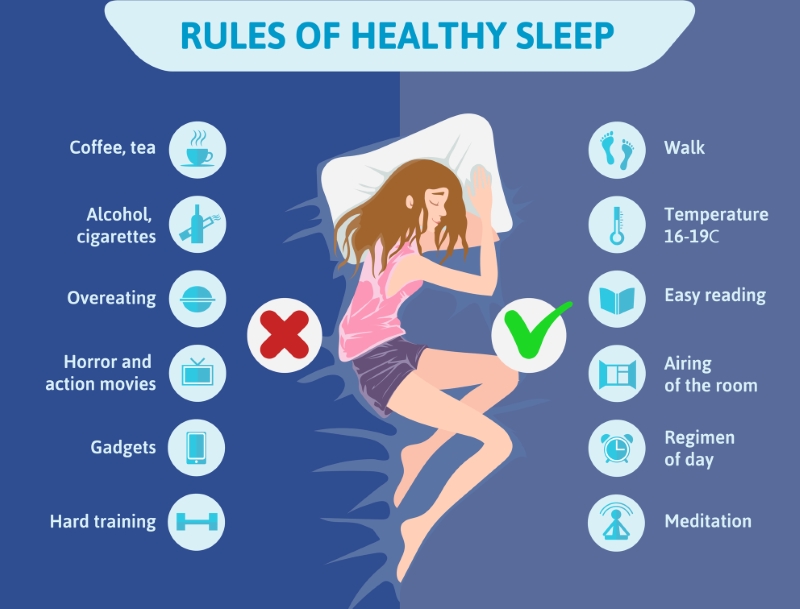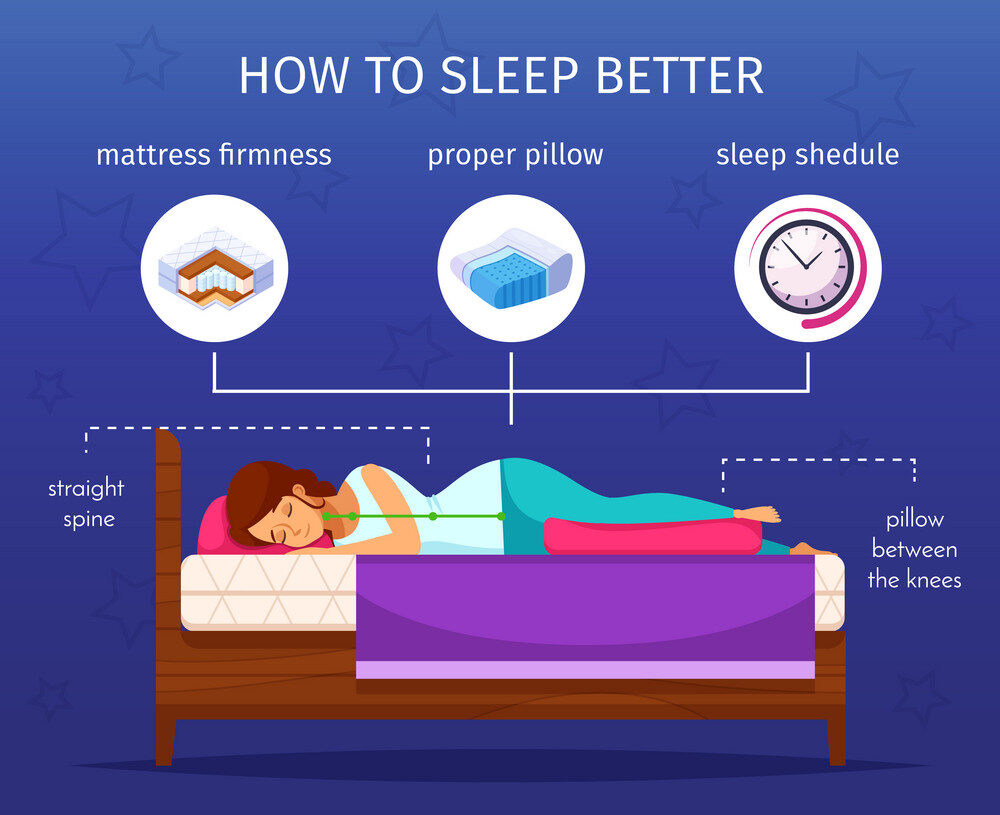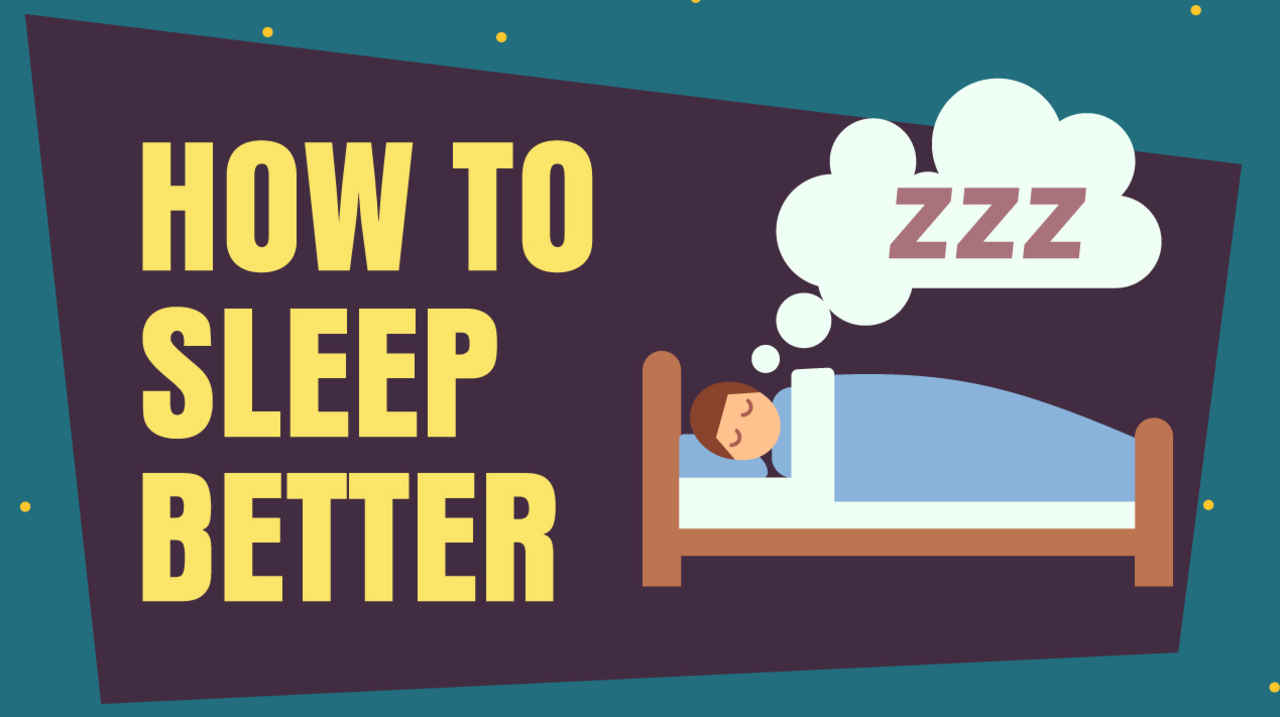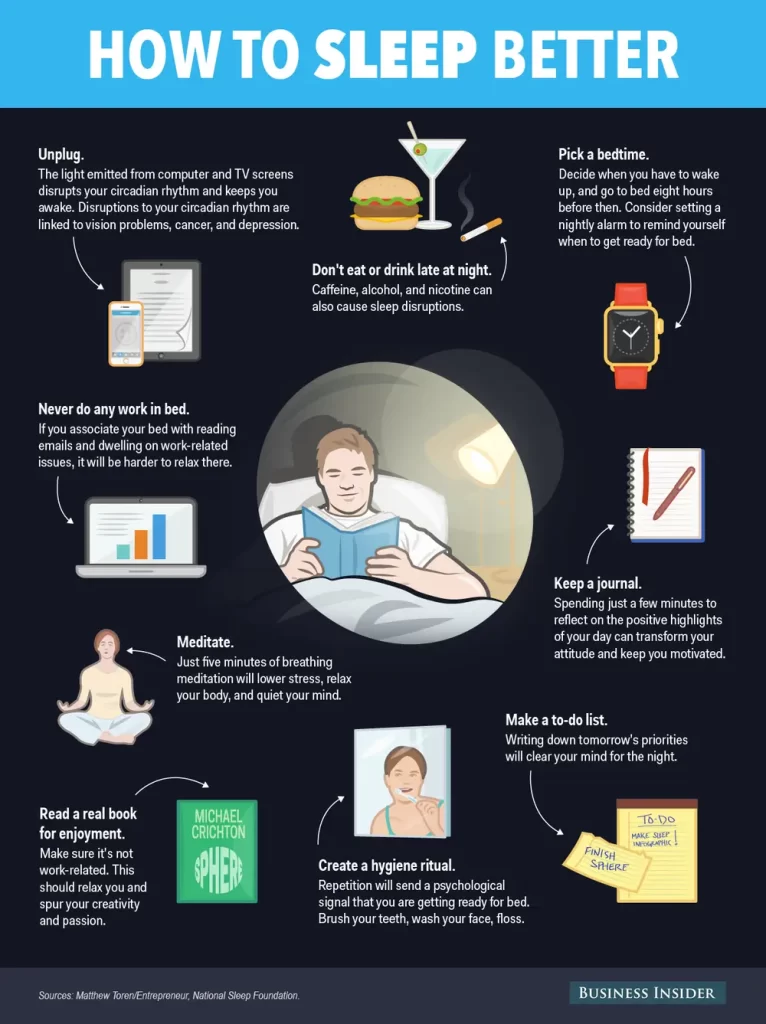How to Sleep Better: Your Guide for Good ZZZ

1. Maintain a constant daily schedule
Picking a set “bedtime” and wake-up time can help normalize your rest routine for your body. Be patient with yourself, as it will likely take some time to change your sleep schedule, but stick with it. It’s important to avoid hitting the snooze button, no matter how tempting. Even if it feels nice in the moment, that extra nap isn’t high quality and will likely just throw off your schedule and make you feel sluggish throughout the morning.
One solution for how to get better sleep is to maintain a consistent sleep schedule throughout the week. If you’re the kind of person who likes to stretch your sleep budget thin during the week, then catch up on the weekends, it’s probably bad news for your overall sleep quality.
However, your sleep quality can be greatly improved by keeping a consistent schedule.
Yes, this might mean going to bed a little earlier on weeknights and waking up a little earlier on weekends, but getting your body’s internal clock properly aligned in this way can have major long term benefits.
In fact, studies have shown that erratic sleep schedules can lead to a higher risk of:1
- Obesity
- Depression
- Other disorders
How To Adjust Your Sleep Schedule
Whether you’re starting a new job, readjusting after traveling to a different time zone, or just trying to break an unhealthy pattern, it can be a challenge to adjust your sleep schedule.
Fortunately, we have some tips for that, too:
- Take it slow. Unlike turning back the clocks (a common cause of disrupted sleep), you don’t have to adjust your sleep schedule all at once. Tweak your bedtime and wake-up time by 15 minutes every day until they’re where you want them.
- Avoid naps. Look, everyone loves a good nap. But if you’re having trouble sleeping, dozing off during the day will only exacerbate the problem. Skip the siestas until your sleep schedule is squared away.
- Become a creature of darkness. We’re going to talk more about creating a relaxing bedtime environment below, but in short, your body doesn’t know it’s time to sleep if you keep shining light in your eyes.
- Then, open those curtains. When it comes to waking up, natural sunlight is what tells our body it’s time to get going. Whenever possible, get some sun on that skin as quickly as possible after your alarm goes off.
Correct sleeping cartoon composition with human sleep statistics and image of sleeping woman with flat icons vector illustration
2. Reduce caffeine intake
Caffeine will take up to 12 hours to completely leave your system. This means that even if you are able to fall asleep at a decent hour with coffee in your system, the quality of your sleep may be severely reduced. Consider only drinking caffeinated beverages in the morning or switching to options with considerably lower amounts of caffeine, like decaf coffees or teas.
3. Turn off the computer or television
In addition to intellectual distractions that may get your thoughts and anxiety going, bright lights from your computer or television will stimulate your brain when it is trying to naturally wind down in the evening. We’d recommend avoiding all electronics at least an hour before you intend to head to bed.
Are you in bed right now searching for tips on how to get a good night’s sleep? First of all, you’re busted! Second, you’re going to need to set aside your phone if you really want to sleep better.
Our sleep-wake cycle (also known as our circadian rhythm) is regulated by the production of the hormone melatonin. Studies have shown that the blue light emitted by cell phones restricts the production of melatonin.2 This means that staring at your phone in bed can literally convince your brain that it isn’t nighttime at all.
(And we’re not even going to get into the agitation or anxiety that can come from scrolling work emails or social media right before trying to sleep.)
To improve your sleep quality, try to stop using screens at least 30 minutes before bed. You might also try these sleep expert activities to help your brain relax:
- Read a book (the paper kind)
- Write in a journal or make a to-do list
- Take a shower or bath
- Meditate or listen to relaxing music
4. Don’t go to bed on a full stomach
Related to the importance of your sleep schedule, it’s important that you try to eat dinner around the same time to keep your body on a regular overall schedule. If you’re really having cravings, stick to small snacks and avoid sugar, alcohol, and nicotine.
Cut Out Midnight Snacks
One activity that isn’t going to help you get better sleep is eating. Admittedly, we’ve all crept into the kitchen late at night to get something to munch on. But, if you’re having difficulty falling asleep, you may need to act like a gremlin, and stop eating after midnight (or well before).
Eating late and then lying down to go to sleep can cause heartburn or acid reflux, leaving you tossing and turning uncomfortably. Furthermore, if you’ve got a sweet tooth, your sugar high or caffeine intake might contribute to your insomnia.
Rather than having a late night snack, consider sipping on a cup of soothing, decaffeinated tea, such as chamomile or lavender tea. And if you do have to have a bedtime snack, consider these healthy late night snacks that will curve your cravings and mitigate your sleep disruption.
5. Don’t go to bed on an empty stomach
At the same time, it doesn’t help to try and sleep when your stomach is growling. If your mind and body are distracted by how hungry you are, it is going to be much more difficult for you to put either at ease as you try to calm yourself for a restful night of sleep.
6. Engage in regular exercise
Exercise can actually help improve both the quality and quantity of sleep you get each nice. You will spend more time in deep sleep cycles if you’ve exercised during your day and will likely feel tired enough to fall asleep more easily. Squeezing in a workout can also help reduce anxiety and stress that normally disrupts your sleep practice.
Exercise, But Not Too Late
Studies have shown that staying active during the day and regularly exercising can lead to better sleep at night. But, there’s a cut-off point.
If you’re an evening exerciser, you’ll want to make sure that your workout is wrapped up at least an hour before you plan to sleep. Why?
Because exercising raises your heart rate and body temperature, it can be harder to get to quality sleep afterwards. You need a proper cool-down before getting into bed.
7. Limit beverage consumption before bed
Like we stated when it comes to eating before bed, it’s best to avoid drinking near your target bedtime. This will help reduce or eliminate any necessary trips to the bathroom that will disrupt your sleeping cycle.
8. Keep your bedroom dark & quiet
Lights can naturally trick your body into thinking you should be awake, so it’s best to reduce outdoor light pollution and limit any indoor lighting in the evening as you prepare for sleep. Any efforts to reduce noise in your bedroom can also go a long way in improving the quality and quantity of your sleep.
9. Invest in a comfortable mattress, pillow & bedding
Having the wrong tools can throw off your entire practice for any endeavor, especially when it comes to building a healthy sleep practice. An investment in your mattress, pillow, and bedding is an investment not only in your quality of sleep but your overall quality of health and life. If you have questions about what the best choices are for your specific needs, you can always reach out to our sleep apnea dentists in Manahawkin.
10. Go to sleep and wake up using your internal alarm clock.
We mentioned the importance of avoiding the snooze button earlier, but the best possible practice is to actually avoid using an external alarm clock altogether.
Get Uninterrupted REM Sleep
REM sleep is the deepest part of our sleepy time cycle. This deeps sleep begins around 90 minutes after we’ve fallen asleep. Getting a healthy amount of uninterrupted REM sleep has been shown to be critically important for a number of reasons:3
- REM sleep improves cognitive function and memory
- A lack of REM sleep can diminish your immune system
- Missing out on REM sleep may cause you to be less alert the next day
- Low levels of REM sleep can make pain hurt more
However, if you’re a light sleeper, getting uninterrupted REM sleep can be easier said than done. To ensure nothing disturbs your slumber, you might try:
- Putting your cell phone on silent to avoid unnecessary notifications
- Wearing an eye mask and/or ear plugs to block out light and sound
- Upgrading to blackout curtains and/or trying out a white noise machine
- Forcing your snoring partner to sleep on the couch (as a last resort, of course)

How Much Sleep Should You Be Getting?
Now that you know our tips on how to sleep better, how much sleep do you really need? Experts break down the recommended hours of sleep like this:4
- Teens (Ages 14 to 17) – 8 to 10 hours
- Young Adults and Adults (Ages 18 to 64) – 7 to 9 hours
- Older Adults (65+) – 7 to 8 hours
(We skipped over children and younger age groups because they probably aren’t reading this. And, honestly, we’re a little jealous that experts recommend they sleep for ten hours per day.)
While these are the recommended ranges for each age group, there are also what’s known as “acceptable” amounts of sleep that expand the spread for each cohort. For instance, until age 25, it’s normal to need up to 11 hours of sleep. Whereas by the time you’ve hit 65, you may feel fully rested on only five hours of sleep per night.
Essentially, everyone’s a little different. While consulting a chart can be helpful, your own sleep needs are going to be unique to you.

How Do I Know If I’m Getting Enough Sleep?
The hours of sleep you need depend a lot on how active you are and your overall health. To assess if you’re getting the optimal amount of sleep, consider the following questions:
- Do you feel grumpy and unproductive throughout your day?
- Do you need to regularly consume coffee or other forms of caffeine to keep going?
If you answered yes to either of these questions, then you’re probably skipping out on restful sleep.
A good way to test this—especially for those of you with a strict wake-up time—is to see how long you sleep on a day off when there’s no alarm to rouse you. That’s not just your body recovering from a tough week; it’s your body telling you how much deep sleep you naturally require.
You might also consider keeping a sleep journal or using a fitness tracker to log how many hours of restful sleep you’re getting. If you’re still struggling to suss out your snoozing statistics, you can consider participating in a sleep study.
Ask Yourself, Is It You Or Your Bed?
You’re sticking to a disciplined sleep schedule, cutting down on screen time, and are active everyday. And yet, when night comes, you’re still tossing and turning. Maybe the problem isn’t you at all.
Some signs you might need a new mattress include:
- Difficulty finding a comfortable position because of poking springs or sagging support
- Feeling jostled or disturbed every time your partner moves around
- Sneezing or itchy eyes caused by a build-up of allergens
Your pillows and sheets can also have a significant impact on your sleep quality.
- Feeling hot during the night? Consider switching to a more breathable sheet or investing in a cooling mattress, like the Wave Hybrid Snow Mattress which features advanced cooling technology that can prevent overheating for over 12 hours.
- Waking up with a stiff neck? You might need to find a pillow that better suits your sleeping position, like a Low Loft Pillow or a Body Pillow.
Your All-day Guide to a Perfect Night’s Sleep
Getting the rest you need isn’t just about bedtime – you’ve got to play the long game. Just make these easy zzz-friendly tweaks to your daily routines and you’ll be snoozing like a koala in no time.
Many people think about sleep about twice a day: at night when they’re tired and need to go to
bed, and in the morning when they’re still tired and want to stay there. But lack of shut-eye affects your whole day. Poor sleepers miss out on immune and emotional regulation as well as tissue restoration and repair, says sleep research psychologist Dr Jessica Payne. Stress may keep you awake, but insomnia can impair your ability to regulate tension the next day, creating a “sleep-stress snowball”, she says.
Stress also increases levels of neurotransmitters and hormones, such as cortisol and norepinephrine, keeping you in a hyper vigilant state, always watchful for tigers (or work enemies). “The more you’re stressed, the poorer your sleep is and the worse your stress is,” Dr Payne says.
Given sleep’s ability to wreak havoc on your waking hours, it only makes sense that your days might be causing you trouble at night. Think of your day like a fitness class, says sleep researcher and neurologist Dr Christopher Winter, author of The Sleep Solution: Why Your Sleep Is Broken and How to Fix It. Your decision-making brain is like a good instructor who leads you through the class, giving notice of what’s coming up next or how many burpees you’ll be doing. Without that sort of guidance, your body holds back, he says, trying to conserve energy to prepare for the unknown.
It boils down to this: A good night’s sleep relies on healthy daytime activities to regulate your internal clock, or circadian rhythm. “The interplay of sleep and rest, when it’s on a schedule, helps signal your brain as to where it is within a 24-hour circadian cycle,” explains Dr Winter. Certain activities send the right signals and others can be harmful, adds neurologist Dr Donn Dexter.
Here’s your 24-hour guide to which is which so you can snooze better, starting tonight.
MORNING
Quit hitting snooze
Your greatest sleep mistakes happen in the morning, Dr Winter says. After a bad night, it’s tempting to give yourself a pity pass to sleep in or take a sick day. On the other hand, a regimented response at the start of the day helps set your brain’s sleep-wake clock. The exception: If you wake up too early, don’t try to force a return to sleep – it’s smarter to go ahead and get up. That reduces the chance of developing a chronic case of insomnia, according to a US study.
Eat breakfast – even if you aren’t super hungry
Banking kilojoules for dinner leads to overeating in the evening, and then a night of fitful sleep as you try to digest that heavy meal. In the morning, be sure to eat some protein, such as eggs, meat, yoghurt or milk. “Protein tends to facilitate the production of dopamine, a wakefulness neurotransmitter,” says Dr Winter. Bonus: dopamine allows you to feel pleasure and satisfaction.
Step outside early
Exposure to morning daylight, preferably combined with exercise, such as walking the dog or to the bus stop, supports regulation of your internal clock, as the sun suppresses melatonin. Even on a cloudy day, a 10- to 30-minute outdoor stroll provides more light than being indoors with all the lights on. If you can do a heart pumping workout, even better. That’ll increase the serotonin that enhances mood and wakefulness and informs your internal clock, Dr Winter says
AFTERNOON
Find 10 mins of downtime
Your temperature naturally drops in the early afternoon, aligned with circadian rhythms, causing sleepiness. A short catnap during your lunch break at the same time each day can reboot energy levels, but it isn’t necessary to fall asleep. “Resting isn’t a failed nap,” Dr Winter says. The goal is to practise relaxation techniques that’ll be useful later at night. Allow your mind to wander and get drowsy for about 10 minutes, then get back to what you were doing, refreshed. Tip: Reading a book in a warm, cosy spot will make your eyes nice and heavy.
Don’t chug coffee
Your body produces adenosine, a molecule that serves as the ‘energy currency’ for the body and also promotes sleepiness, says Dr Mathew. As a stimulant, caffeine blocks adenosine and inhibits your brain’s natural increase in sleepiness as you move toward nighttime. Herbal tea or water is better in the afternoon. Plus, if you drink water throughout the day, you’ll need less in the evening, helping you to avoid those 3am bathroom trips.
Work out in the daytime
Exercising raises body temperature and levels of epinephrine and adrenaline, known sleep fighters. So, work out only during daylight hours to give time for heat and hormones to quiet down. “A falling body temperature almost acts like a signal that brings on sleep,” Dr Mathew says.
Do a short meditation
Decreasing daytime anxiety and worry can help you doze more deeply at night. Find five to 10 minutes to use the ‘body scan’ meditation technique, observing your body’s sensations, moving slowly from toes to scalp (or the reverse). Melt away stress either on your own or using a
guided meditation in an app or on YouTube.
EVENING
Write down what’s bugging you
Dr Payne says that when you don’t offload the day’s events, your brain continues to process stressful situations throughout the night. So, by writing down any problems beforehand, you can improve compartmentalisation and save figuring out the solutions for the morning. If you’re lying in bed stressing about sleep itself, get up and do something quiet for 15 minutes, such as reading or sketching in a low-lit room – steer clear of bright screens. “Some people treat the bed like a bus stop,” Dr Winter says, and obsess over missing the sleep bus. Adjust your expectations and start again tomorrow.
Create a ritual
Any kind of stimulus is problematic – even mindless Netflix reruns. You’ll experience subtle increases in blood pressure, heart rate and sweating. Instead, take at least 20 minutes to dial it down. Try gentle stretching, meditating or taking a bath. Think of it as a ‘bookmark’ at day’s end, Dr Payne says, telling the body and brain it’s okay to sleep.
Turn off the ceiling lights
Exposure to bright blue light can reduce melatonin levels by up to 50 per cent, says Dr Satchin Panda, author of The Circadian Code. And it’s not just your phone that’s to blame. Cool-hued ceiling lights also produce blue light. So, after dinner, switch to table lamps and fl oor lamps with warm- or orange-hued light bulbs. Electronic devices should also be set to night mode to warm the screen colour.
Stop eating at least two hours before bed
And also keep dinner on the lighter side. Your body’s digestive and waste functions need rest and downtime and to learn when “the kitchen is closed”, Dr Panda says, to prevent midnight snacking.
Are you getting enough sleep?
There’s a difference between time in bed and optimal shut-eye. The ideal sleep amount is between seven and eight hours, but to pull that off, you need to slide between the sheets at least eight hours before the alarm sounds. That way, you’ll have unhurried time to fall asleep and accommodate unplanned night waking. It’s normal to wake up during the night or toss and
turn a bit, but taking more than 30 minutes to fall back asleep is known as ‘sleep maintenance
insomnia’. If you’re having issues with night waking, try avoiding naps altogether during the day, suggests sleep expert Dr Reeba Mathew.
Could it be serious?
When patients visit Dr Mathew with sleep-related problems, she first rules out an undiagnosed sleep disorder, such as sleep apnoea, sleep-related low oxygen or restless legs syndrome.
Patients with untreated apnoea, for example, have an increased risk of blood pressure-related and cardiac problems, including heart failure, she says. A vicious cycle between untreated apnoea and early heart disease can ensue and, in severe cases, lead to risk of heart attack. Seek your doctor’s advice if you have been snoring, get plenty of sleep but still feel fatigued, or are otherwise concerned.


Sources:
- Everyday Health. How to Fix Your Sleep Schedule. https://www.everydayhealth.com/sleep/insomnia/resetting-your-clock.aspx
- British Journal of Ophthalmology. Blocking the Blue. https://www.ncbi.nlm.nih.gov/pmc/articles/PMC1857207/
- The National Sleep Foundation. What Is REM Sleep? https://www.thensf.org/what-is-rem-sleep/
- Sleep Foundation. How Much Sleep Do We Really Need? https://www.sleepfoundation.org/how-sleep-works/how-much-sleep-do-we-really-need
- source
- source
- source
Learn about how sound can help aid your sleep process:
Why Walnuts Are A Good Snack To Eat Before Bed
The Right Noise – Pink, White ,Brown, Blue, Black, and Red Noise: Your Guide to a Good Night’s Sleep
How to Sleep Better: Your Guide for Good ZZZ
Everything You Need To Know About Magnesium And Sleep
Optimizing the Sleep-Wake Cycle
How to Reset Your Sleep Cycle When You Live With Insomnia
The Importance of Sleep with Alzheimer’s
What You Eat Affects How You Sleep
GABA & L-theanine mix Improves REM Sleep, Stabilizes mood and helps with depression
What Happens When Circadian Rhythm Is Off? Learn More
Do You Wake Up Every Night At The Same Time? Learn More
How to Reset Your Sleep Cycle When You Live With Insomnia Learn More
What You Eat Affects How You Sleep? Learn More
GABA / L-theanine mixture Improves REM Sleep, Antidepressant, and Mood-stabilizing Study Says Learn More



